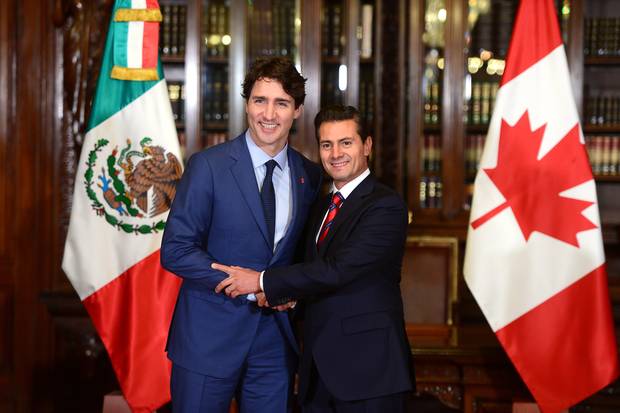The basics
- Prime Minister Justin Trudeau’s NAFTA goodwill tour wrapped up in Mexico City Friday, after he and the Mexican President vowed not to hastily walk away from the negotiating table for the trilateral trade deal.
- Mr. Trudeau gave a speech to the Mexican Senate on Friday morning, speaking about the North American free-trade agreement and Canada-Mexico relations and appealing to senators to do more to advance women’s rights in the country.
- Mr. Trudeau arrived in the Mexican capital on Thursday to meet with President Enrique Pena Nieto on his first official visit to the country. At a news conference Thursday, the leaders said they were still committed to the NAFTA talks despite hardline positions taken by U.S. President Donald Trump, who threatened earlier this week to rip up the deal if his administration isn’t happy with it.
- But behind the scenes, Canadian officials told The Globe and Mail they are growing increasingly doubtful that a deal can be struck.
- At NAFTA talks in Arlington, Va., the Americans have proposed major changes to one of Mexico and Canada’s more contentious issues: Auto manufacturing. Auto industry and government sources told The Globe that the U.S. wants at least 85 per cent North American content and 50 per cent U.S. content in duty-free vehicles. The current rule is 62.5 per cent North American content.
- Mr. Trudeau flew to Mexico City from Washington, where, after a meeting with Mr. Trump on Wednesday, the Prime Minister acknowledged for the first time that the 23-year-old NAFTA deal could fall apart. Here’s a full primer on what Mr. Trudeau said and did in the U.S. capital.
- Mr. Trump was ambivalent about whether a deal could be reached. He also hinted that he might pursue bilateral deals with either Mexico or Canada.
- The fourth round of NAFTA talks is under way in Virginia until next Tuesday. Here’s a primer on the issues behind the talks and what the countries are asking for.
How the visit unfolded
Mr. Trudeau and his wife, Sophie Grégoire Trudeau, arrived in Mexico City shortly before noon local time (1 p.m. ET) on Thursday, welcomed by Foreign Minister Luis Videgaray.
Prime Minister Trudeau and Sophie Gregoire Trudeau arrive in Mexico. Greeted by Foreign Minister Luis Videgaray. pic.twitter.com/2nbPrO178y
— Laura Stone (@l_stone) October 12, 2017
The pomp and circumstance that greeted Mr. Trudeau at the airport was followed by a sombre wreath-laying ceremony at a monument commemorating Mexico's efforts to beat back an American invasion in the 1850s – an apt image as both Canada and Mexico now contemplate how to withstand new U.S. strong-arming efforts over trade.
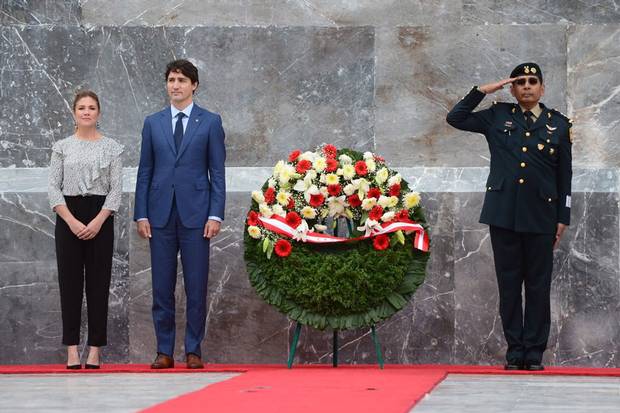
The Trudeaus attend a wreath-laying ceremony at the Ninos Heroes monument in Mexico City’s Chapultepec Park.
SEAN KILPATRICK/THE CANADIAN PRESS
The Trudeaus then stopped by a Red Cross aid distribution centre, donning volunteer vests and handing over boxes of baby goods, foods and household supplies for earthquake relief efforts.
Trudeaus visit Red Cross volunteers in Mexico City
Later that afternoon, Mr. Trudeau went to the National Palace for extended bilateral talks with Mr. Pena Nieto. The leaders talked with their aides and then their foreign affairs and trade teams for close to two hours. While the two sides were discussing a range of issues, the ongoing talks to rework NAFTA were a large part of the discussion.
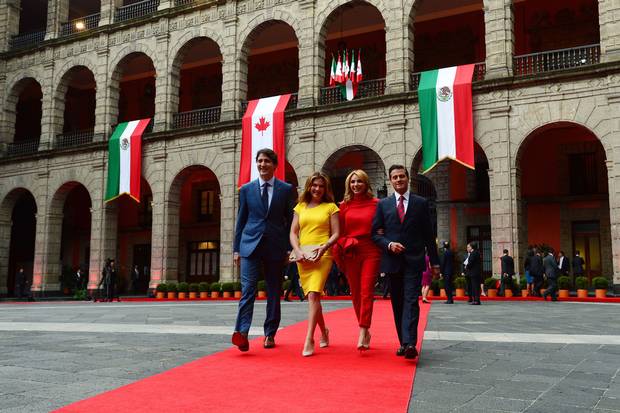
Mr. Trudeau, Ms. Grégoire Trudeau, President Enrique Pena Nieto and his wife, Angelica Rivera, leave the official welcoming ceremony at the National Palace.
SEAN KILPATRICK/THE CANADIAN PRESS
At a joint news conference Thursday night, the leaders pledged that they wouldn't walk away from NAFTA talks despite a U.S.-proposed sunset clause on the deal. Mr. Trudeau affirmed that proposals like these would be dealt with at the negotiating table:
We will continue to take very seriously the work we do and we will not be walking away from the table based on proposals put forward. We will discuss those proposals, we will counter those proposals and we will take seriously these negotiations.
Mr. Pena Nieto suggested that while observers have made predictions that certain proposals could tank the talks, that's only speculation:
I would not pay much attention to any statements other than that which happens (at) the negotiation tables.
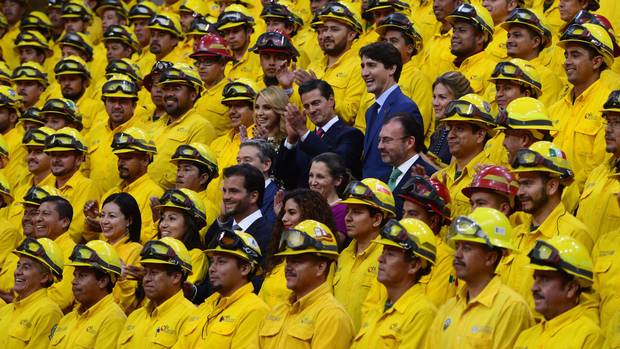
At the news conference, Mr. Trudeau, Mr. Pena Nieto, their wives and ministers take part in a photo op with Mexican firefighters, who helped to fight Canadian forest fires.
SEAN KILPATRICK/THE CANADIAN PRESS

The Canadian and Mexican leaders and their wives make a toast at the National Palace.
ALFREDO ESTRELLA/AFP/GETTY IMAGES
But behind the scenes, senior Canadian officials told The Globe that they were pessimistic about whether NAFTA could be saved. One source said Mr. Trump's protectionism was a major stumbling block as the negotiations continued this week in Arlington, Va.:
The negotiations so far, with the exception of the easy stuff, are not going well. They are not going well because you are negotiating a free-trade agreement with a protectionist Donald Trump. It is the most protectionist administration since the early 1930s.
On Friday morning, Mr. Trudeau was welcomed to the Mexican Senate. In a speech, he encouraged the countries to stay optimistic and committed to a liberal global order:
Isolationism is taking hold in too many corners of the world, but our people must not succumb to fear. We, as leaders, must not succumb to fear. Our challenge lies in ensuring that everyone benefits from economic growth. And we do that by pursuing an ambitious, progressive vision of what the future can — and should — look like.
He also urged the senators to do more for women's rights, saying he had heard about unacceptable treatment of women and girls in Mexico during his trip, calling such treatment unacceptable:
Violence against women and girls is prevalent in all facets of life, from the studios of Hollywood to the digital public squares, our halls of Parliament. As a gender-balanced Senate, I challenge you to use your position and power to strongly push for the rights of women and girls in Mexico and around the world.
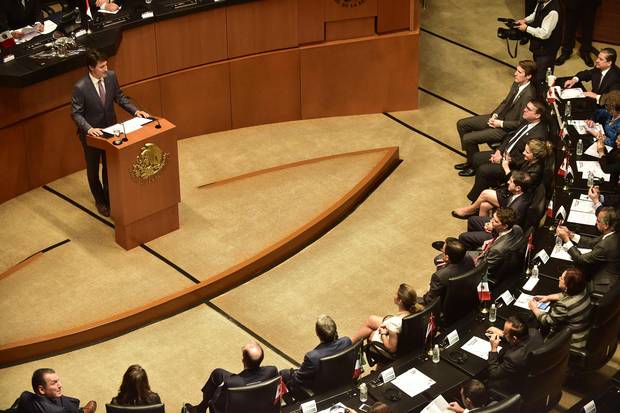
Mr. Trudeau delivers a speech during his visit to the Mexican Senate.
PEDRO PARDO/AFP/GETTY IMAGES
Trudeau's host: Enrique Pena Nieto
Mexico's President is a long-standing ally of Mr. Trudeau's, with similar views on free trade. This is the Prime Minister's first official visit on Mr. Pena Nieto's home turf; Mr. Pena Nieto made a state visit to Canada in June, 2016.
Donald Trump's rise to power has been a difficult test for Mr. Pena Nieto, who has had to walk the line between alienating his country's biggest trading partner and giving in to a politician who has disparaged Mexico often and wants to build a border wall. Last summer, Mr. Pena Nieto's decision to invite Mr. Trump, then still a presidential candidate, to Mexico backfired badly as media and political opponents accused him of trying to appease a national adversary.
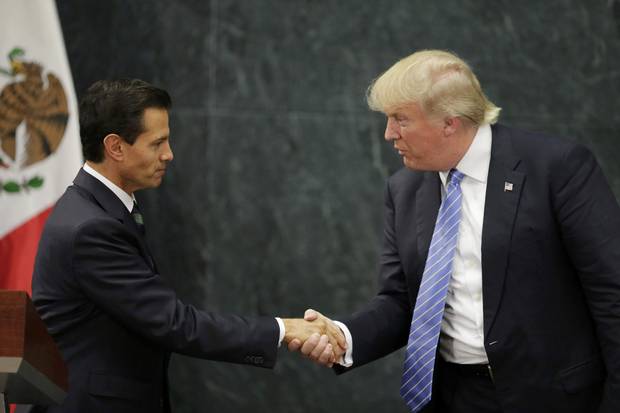
Aug. 31, 2016: U.S. Republican presidential nominee Donald Trump shakes hands with Mr. Pena Nieto shake hands at a press conference at the Los Pinos residence in Mexico City.
HENRY ROMERO/REUTERS
In January, Mr. Pena Nieto cancelled a visit to Washington after the White House proposed a 20-per-cent import tax to pay for the wall. Relations between the two leaders gradually softened; in August, a phone call from Mr. Pena Nieto, and another from Mr. Trudeau, persuaded the President to back off from threats to terminate NAFTA immediately.
The Trump era has been disastrous for Mr. Pena Nieto's fortunes in the polls. In the most recent Pew Research Center poll, only 28 per cent of Mexicans expressed a favourable opinion of him, with 80 per cent disapproving of how he has handled the economy.
But Mr. Pena Nieto won't have to deal with his mercurial U.S. counterpart much longer: His term ends next year, with Mexicans voting for a new president on July 1. The perceived front-runner, Andres Manuel Lopez Obrador – nicknamed "Amlo," from his initials – is a left-wing, populist and stridently anti-Trump candidate. The election is one reason for the aggressive U.S. timetable in renegotiating NAFTA: The Trump administration wants a new deal locked in by the end of the year.

Canadian Prime Minister Justin Trudeau, left, and his wife, Sophie Grégoire Trudeau, right, are welcomed to the White House by U.S. President Donald Trump and first lady Melania Trump on Oct. 11, 2017.
JONATHAN ERNST/REUTERS
Previously, in Washington
Mr. Trudeau's previous stop on the NAFTA goodwill tour was Washington, where he met Mr. Trump at the White House. Speaking alongside Mr. Trudeau in the Oval Office, Mr. Trump reiterated previous threats to terminate NAFTA if no agreement can be reached, and suggested bilateral deals with either Canada or Mexico could be a possibility:
I think Justin understands this, if we can't make a deal, it will be terminated, and that will be fine. They're going to do well and we're going to do well. But maybe that won't be necessary. But it has to be fair to both countries.
Trump says he’s opposed to NAFTA as Trudeau looks on in Oval Office
At a news conference after their meeting, Mr. Trudeau was still optimistic about a fair resolution to the NAFTA standoff, but acknowledged that the Trump administration is unpredictable and the deal's future is far from certain:
I think Canadians are aware that the American administration, and the President, makes decisions that surprise people from time to time. And that is certainly something that we are very much aware of, and very braced for, and conscious of. We know that there is a certain level of unpredictability these days.
Trudeau remains optimistic for a positive outcome to NAFTA negotiations
One of the Trudeau administration's major talking points, before and after the Washington trip, was that Canada is the biggest U.S. trading partner: "We are already your biggest customer," he said at a meeting with the House ways and means committee. Some observers interpreted that as a sign that Canada was distancing itself from Mexico. Elsewhere in Washington on Wednesday, Arturo Sarukhan, the former Mexican ambassador to the U.S., told a NAFTA-related event hosted by Dentons law firm that some Mexicans feared their united front with Canada would break at the negotiating table:
Some of us in Mexico think that on several occasions our Canadian friends have come close to throwing us under the bus. How do we Mexicans ensure [our] Canadian friends stay focused on a trilateral approach?
NAFTA: What will Mexico do next?
In the NAFTA negotiations, Mexico and Canada have been fighting back against protectionist proposals by the Trump administration – some of which, critics suggest, are designed to make them balk and walk away from the deal. Proposals such as a five-year sunset clause are a "poison pill" with which the Trump administration intends to kill the deal, explained Thomas Donohue, president of the U.S. Chamber of Commerce, to a Mexico City audience Tuesday.
While Mr. Trudeau is still optimistic that NAFTA can be saved, several high-level Mexican officials have said they'd prefer to let it die if the only alternative is an unfair deal. On Tuesday, Mr. Videgaray, the Foreign Minister, said NAFTA's demise would be a breaking point in U.S.-Mexican relations, but Mexico would survive it:
We have to be prepared to say no, and if necessary to get up from the table and if necessary leave the treaty. It would not be the end of the world.
Mexico's ambassador to the United States, Geronimo Gutierrez, told The Globe and Mail that his country is also willing to walk away from NAFTA if it can't get a good enough deal, though it still hopes to improve the agreement instead:
Mexico's position will continue to be serious and constructive, but we have also been very clear about the fact that we rather leave the negotiating table than [accept] a harmful deal.
NAFTA's Article 2205 lets any member country announce their withdrawal from the deal with six months' notice. Mr. Trump has threatened to do this several times, though he's sometimes framed it as a negotiating tactic to force Canada and Mexico's hand rather than a final move.
Uncertainty about NAFTA's fate has been driving down the Mexican peso against the U.S. dollar in recent weeks.
In Mexico City on Thursday, Mr. Pena Nieto indicated he was paying attention to the suggestion by Mr. Trump that, if NAFTA talks fail, bilateral deals could be negotiated instead. Afterward, Mr. Trudeau didn't rule out the notion, and Mr. Pena Nieto said he did discuss it with the prime minister Thursday.
In his Thursday opinion piece for The Globe, Mr. Pena Nieto suggested that, whatever happens, Canada and Mexico's bilateral relationship should remain strong:
The government of Mexico will keep working constructively with Canada to further strengthen our relations, achieve mutual benefits and contribute to reaching our shared goal: to make North America the most prosperous and competitive region in the world. ... I am convinced that this vital junction for Canada-Mexico relations will translate into more and better opportunities for our countries.
With reports from Laura Stone, Adrian Morrow, The Canadian Press, Reuters and Associated Press
CANADA, NAFTA AND THE WORLD: MORE FROM THE GLOBE
